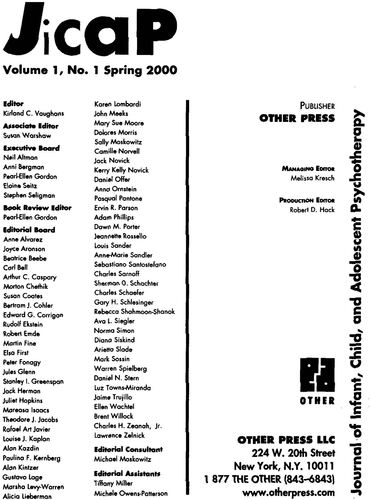 In his initial editorial, the founding Editor in Chief of the Journal of Infant, Child, and Adolescent Psychotherapy outlined what at the time seemed a bold mission for this new publication (Vaughans, reprinted 2022, 21#1). In an era that had become increasingly antagonistic to treatment perspectives rooted in psychoanalytic developmental theories, we were giving birth to a new psychodynamic infant/child/adolescent psychotherapy journal. The specifics of the mission of the journal were outlined in Vaughan’s first editorial (reprinted in Volume 21, issue 1, 2022). We were aspiring to be a journal devoted to publishing work representative of various psychoanalytic traditions, welcoming of multiple theoretical approaches to intervention, including non-analytic and integrative approaches, but remaining solidly grounded in our commitment to psychoanalytic developmental theory and research. We aspired to be a journal that spoke to the concerns of practitioners in various settings, be they Clinic, School, Forensic, Foster Care Agencies, or private offices. Focusing on “real world issues” impacting infants, children, adolescents, and their parents, we wished to speak in experience near and accessible terminology to the myriad of therapists who struggle with issues which impact our young.
In his initial editorial, the founding Editor in Chief of the Journal of Infant, Child, and Adolescent Psychotherapy outlined what at the time seemed a bold mission for this new publication (Vaughans, reprinted 2022, 21#1). In an era that had become increasingly antagonistic to treatment perspectives rooted in psychoanalytic developmental theories, we were giving birth to a new psychodynamic infant/child/adolescent psychotherapy journal. The specifics of the mission of the journal were outlined in Vaughan’s first editorial (reprinted in Volume 21, issue 1, 2022). We were aspiring to be a journal devoted to publishing work representative of various psychoanalytic traditions, welcoming of multiple theoretical approaches to intervention, including non-analytic and integrative approaches, but remaining solidly grounded in our commitment to psychoanalytic developmental theory and research. We aspired to be a journal that spoke to the concerns of practitioners in various settings, be they Clinic, School, Forensic, Foster Care Agencies, or private offices. Focusing on “real world issues” impacting infants, children, adolescents, and their parents, we wished to speak in experience near and accessible terminology to the myriad of therapists who struggle with issues which impact our young.
The founding executive board members who worked collaboratively to develop JICAP, were all psychoanalysts, trained in American Interpersonal, Relational and/or Contemporary Freudian traditions, and all, having worked in community settings, believed strongly in the significance of understanding the cultural context and its impact on development and psychotherapy. The seven of us (Kirkland Vaughans, founding Editor in Chief, Susan Warshaw, founding Associate Editor, Neil Altman, Anni Bergman, Pearl-Ellen Gordon, Elaine Seitz, and Stephen Seligman) met frequently, over a period of 3 years prior to our first publication date and also established the JICAP Foundation, which is our parent organization to this day. With the extraordinary support of many in the broader psychoanalytic and infant/child/adolescent psychotherapeutic community, we built an outstanding multi-disciplinary Editorial Board, and began publishing in the Spring of 2000. The names of all members of our founding boards, including our assistants and consultants, are listed as Acknowledgments at the end of the Editorial Introduction, and we wish to extend our deepest gratitude to all for their contributions to our growth.
Not spoken of at that time, and rarely since, was that our Founding Editor in Chief is a black clinical Psychologist/Psychoanalyst, steeped in community work, a rare and brave voice in the psychoanalytic psychology publishing world. It is to Kirkland Vaughans, Ph.D. whose career has become legendary within psychoanalytic circles, that we dedicate this entire 21st Volume of JICAP, his “brainchild.” In his own quiet manner, and with great wisdom, Dr. Vaughans influenced both the trajectory of the journal and all of those who have worked closely with him. It is now approximately 25 years since we began working to establish JICAP, and with this special issue, honoring our 21st Volume, we continue our mission, committed to Ethnic, Racial, Religious, Gender, and Economic diversity, all to be understood in Sociocultural context.

